Editor’s note
Tsinghua University has long been at the forefront of promoting the United Nations' 17 Sustainable Development Goals (SDGs). The institution plays an active role in nurturing innovative talents, advancing groundbreaking research, and contributing in numerous ways to the global pursuit of sustainability.
The newest cohort of Rhodes Scholars from China was announced on November 21, and Samson Cheng was selected as a Rhodes Scholar. Samson Cheng's story is a testament to Tsinghua's dedication to these goals. In his endeavors, Samson Cheng has seamlessly integrated his academic pursuits with real-world impact. His involvement in climate diplomacy, biodiversity protection, and sustainable development financing exemplifies Tsinghua's values and commitment to the SDGs.
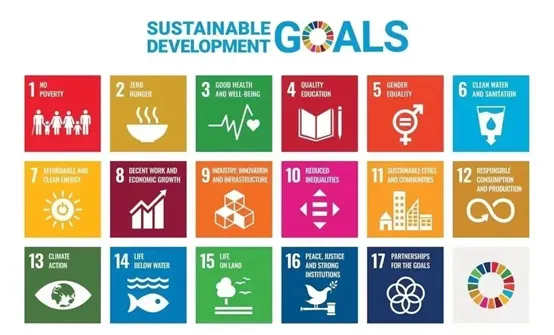
Hou Sang (Samson) Cheng, a Schwarzman Scholar from Macao SAR, China, has a background in the Global Environment Program at Tsinghua University. He enhanced his academic journey with an exchange semester at Venice International University and a summer research program at the University of British Columbia. Samson's research interests predominantly revolve around climate diplomacy and development financing. He has demonstrated his commitment to environmental sustainability by co-founding the Student Net-zero Future Association at Tsinghua.
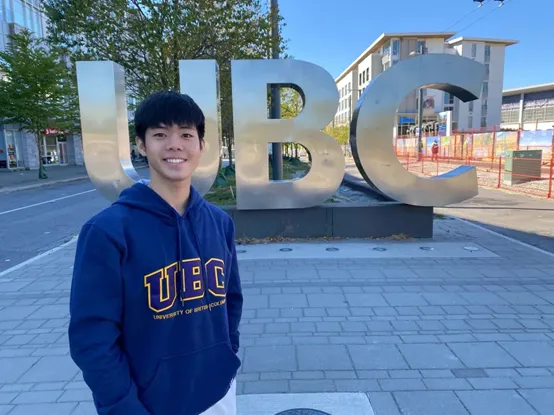
Samson Cheng at the University of British Columbia, Vancouver
Samson underscores, "Those who are privileged to possess knowledge bear the responsibility to take action," emphasizing the pressing need to not only safeguard the natural beauty of our world but also to prevent human society from plunging into a developmental catastrophe. This dedication grew increasingly evident as he acknowledged that the most marginalized bear the heaviest and most disproportionate burdens.

Samson with his colleagues at UNDP China
The harsh reality of climate change's direct impact on vulnerable communities and regions struck Samson when a powerful typhoon devastated his hometown, Macao, in 2017, resulting in casualties and economic losses exceeding 8.31 billion Macao Patacas. This pivotal moment in his life inspired him to take action. During high school, he initiated numerous green initiatives and campaigns, actively participating in the student council and voluntary community service as he began his journey towards making a positive impact on the environment.
His initial goal was to raise awareness among others, but as he engaged with diverse individuals and conducted research online, he found himself increasingly educated. He realized that comprehending the climate crisis extended beyond environmental science and engineering; it involved systemic challenges spanning diverse disciplines like foreign policy, economics, management, and law. As a result, he decided to enroll in the high-engagement, multidisciplinary Global Environment Program at Tsinghua University.
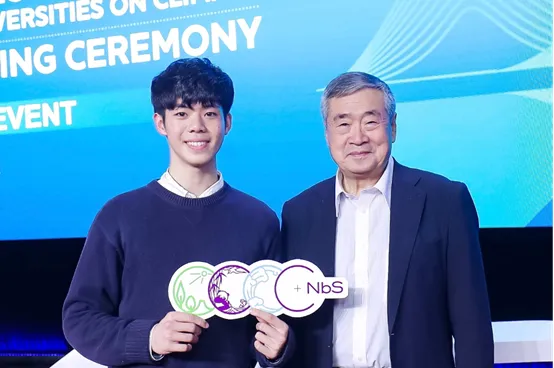
Samson Cheng at the Global Alliance of Universities on Climate Graduate Forum
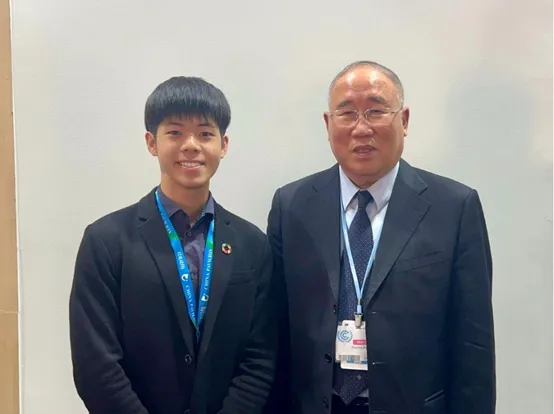
Samson and China's climate envoy Xie Zhenhua exchanged ideas at COP27 in Sharm El-Sheikh, Egypt
In addition to his academic pursuits, Samson gained hands-on experience in addressing climate change. He completed internships at institutions like the National Center for Climate Change Strategy and International Cooperation (NCSC) under the China Ministry of Ecology and Environment (MEE). He also attended several crucial UN Climate Change and Biodiversity conferences, including UN Climate SB56, COP27, and Biodiversity COP15, gaining firsthand insights into global environmental efforts. His impact extended beyond conferences, as he frequently appeared in the media as a Global Youth Ambassador for the Global Alliance of Universities on Climate (GAUC) and Global Communication Ambassador for Tsinghua University. His involvement spanned Tsinghua University's Institute of Climate Change and Sustainable Development and the Environmental Protection Bureau of Macao. His contributions included drafting sections of the " Annual Report on Actions to Address Climate Change (2021)" and contributing to the “2023 Global Carbon Neutral Annual Progress Report”.
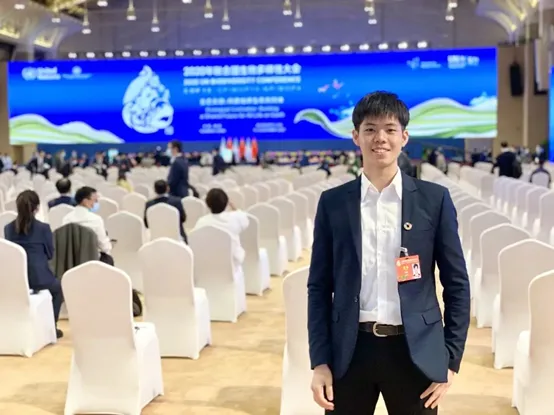
Samson Cheng attending the opening ceremony of COP15
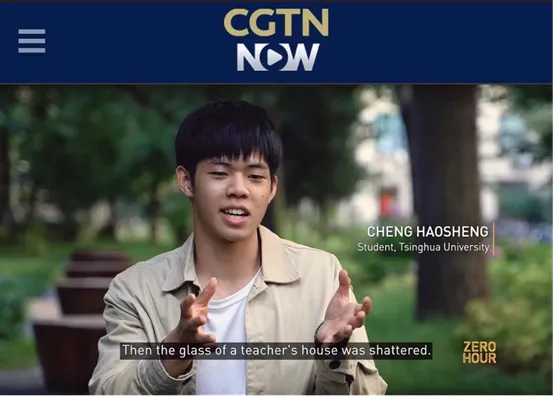
Samson’s appearance in the CGTN climate youth action documentary "Zero Hour”
He believes that global climate governance has transitioned from rule-making to implementation, with a pressing issue being countries’ propensity to speak more than they act. It's not just businesses engaging in greenwashing; countries are also culpable. The most glaring example is that most developed countries are disregarding the Paris Agreement’s 2 degrees Celsius target, favoring the more ambitious 1.5 degrees Celsius goal. This intensifies public pressure on developing countries, as their 2050 net-zero goals are deemed inadequate and subject to yearly fluctuations, posing a significant challenge. Collaboration, adherence to the principle of "Common But Differentiated Responsibilities," green development, and a shared future for all, encompassing both people and nature, are imperative for upholding the integrity of the Paris Agreement.
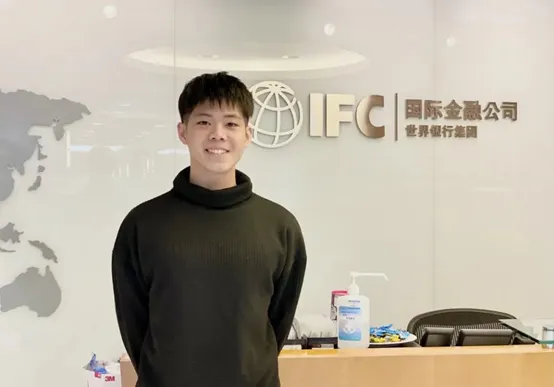
Samson Cheng at IFC
Furthermore, during his internship at the United Nations Development Programme (UNDP), Samson focused primarily on the localization of the Biodiversity Finance Initiative (BIOFIN) within China and collaboration with the private sector. Subsequently, at the International Finance Corporation (IFC) within the World Bank Group, Samson successfully established a database for African-Chinese-funded enterprises and harnessed the IFC framework to evaluate the sustainability and financial performance metrics of prospective investment targets.
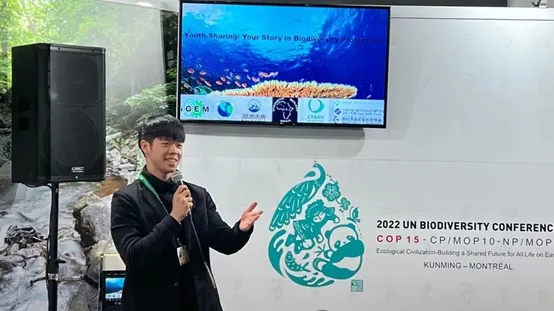
Samson Cheng sharing at the 2022 UN Biodiversity Conference COP15
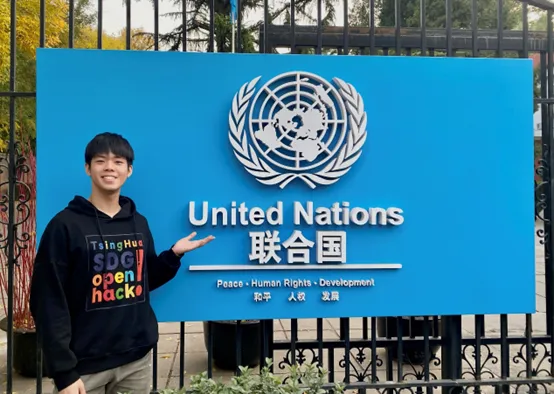
Samson Cheng at the UN
When tackling environmental challenges, Samson emphasizes the significance of understanding a nation's current environmental investments and measures across various sectors and departments – an aspect often underestimated. For instance, the Health Department allocates substantial funds and manpower to establish a sensitive health registry, which is a vital climate adaptation measure. Similarly, the Customs Department deploys significant resources and technology to inspect incoming vessels, making a substantial contribution to preventing invasive species. This comprehension serves as a crucial initial step in formulating a future financial plan that prioritizes climate action and biodiversity conservation. Rather than stifling opposing viewpoints, such as the common tendency to generalize and condemn fossil fuel companies, he advocates for a more pragmatic approach: comprehending their concerns and objectives, engaging in rational debates and counterarguments, and actively seeking practical solutions.
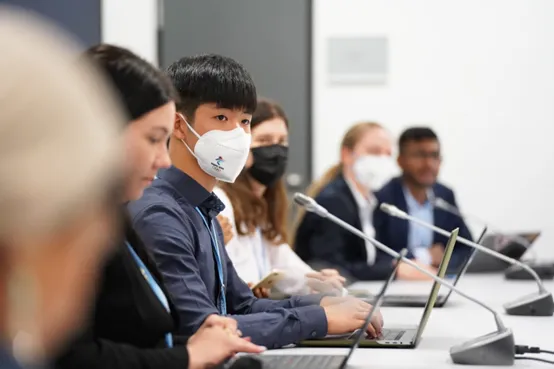
Samson Cheng
Regarding implementation strategies, Samson has learned the importance of a comprehensive approach considering various aspects. In China, the primary targets are often government authorities and influential organizations. Whilst in the business sector, examples show that companies can invest in greener, more sustainable supply chains, aligning with sustainable development principles. Under stringent economic situations, there are discussions about whether businesses should continue to allocate substantial sums to social responsibility. Yet, examples like UNDP’s partner Dr Plant demonstrate that companies invest in protected areas not solely for social good but also for their own supply chain benefit.
Samson's research journey to South Africa and Brazil provided profound insights into the accelerating transmission of infectious diseases in slum areas due to rising temperatures, offering valuable perspectives on climate's impact from a health and security standpoint. He recognizes that extreme weather disrupts agriculture and exacerbates social inequality and violence, particularly in developing nations. Consequently, he resolved to engage in the Schwarzman Scholar Program, seeking a deeper understanding of how the next generation of leaders perceives global climate governance and its intricate links with emerging global challenges.
In addition, since middle school, Samson has been an active volunteer, consistently dedicated to serving his community. During the COVID-19 pandemic, he took on multiple roles, including that of an online teacher and waste sorting guide. His commitment earned him recognition as a five-star volunteer at Tsinghua. He firmly believes that volunteer work is not only a means of giving back to society but also a way to gain a deeper understanding of society, especially its most vulnerable members. Moreover, Samson is deeply passionate about sports and the arts. He is an accomplished flutist in Tsinghua's military band and has served as the captain of the School of Environment's swimming team. He is also a dedicated member of the university's long-distance running team, achieving a podium finish in over twenty school athletic competitions.
Outlook
After four years of intensive engineering education and his current exploration of different cultures and industries at Schwarzman College, Samson has come to realize that while environmental studies are accessible to professionals from diverse backgrounds, the world now demands experts with profound expertise in specific environmental domains while still maintaining a robust interdisciplinary perspective.
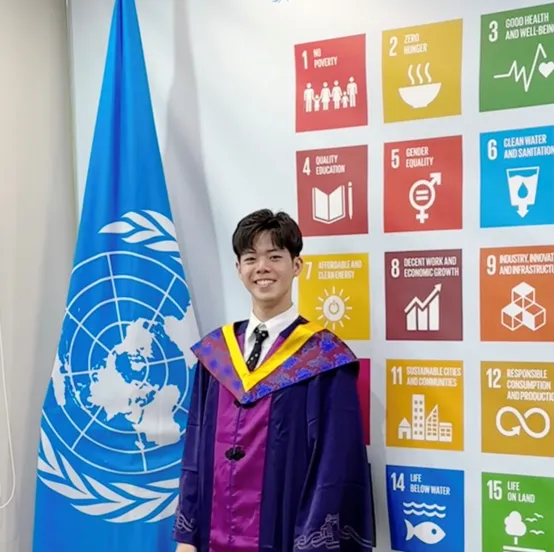
Samson when graduating from his undergraduate studies in Tsinghua
In the future, he hopes to continue to support climate negotiations through evidence-based research, aiming to dissect not just what countries say, but what they actually do. He aspires to see more research applied in practical contexts, drawing from his prior experience with the government and international organizations.
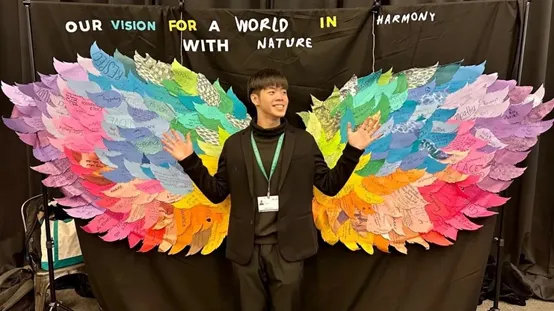
Samson Cheng Aspiring towards the Future
Read more about THU!

Explore the world of Tsinghua Equestrian!
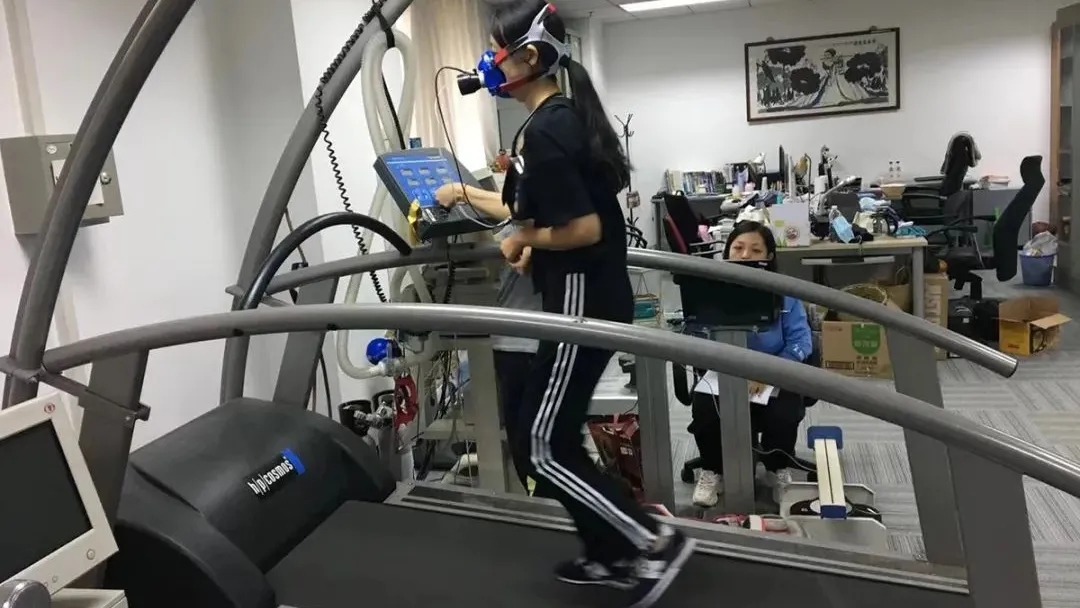
Moderate-intensity exercise has important brain-boosting effect

How can I make Tsinghua's autumn last forever